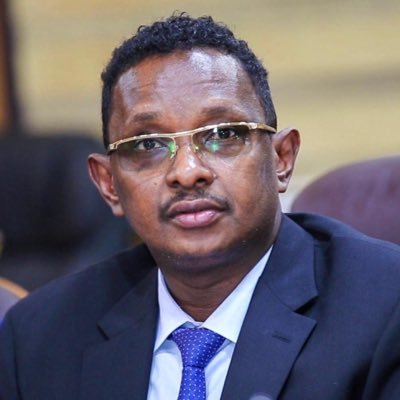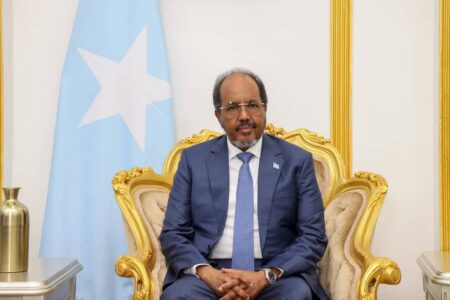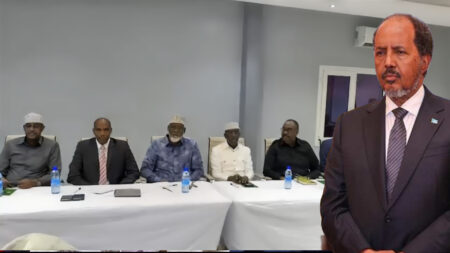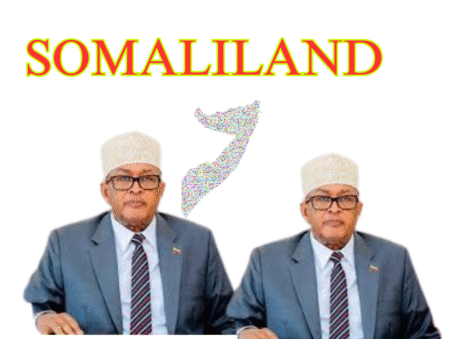The editorial published by The Somali Wire and penned by the fake Dr. MP. Mursal M. Khalif is a politically charged misrepresentation of facts, constructed not to inform but to provoke division, undermine progress, and breathe life into the false narrative of a fractured Somalia. It is disappointing to see such a relentless campaign of distortion against a legitimately elected president, Hassan Sheikh Mohamud, whose administration is one of the few in recent Somali history to embark on a national agenda rooted in rule of law, federalism, and reconciliation.
Understanding the Role of Division in Somali Politics
To accuse President Hassan Sheikh of squandering political goodwill is to erase the countless diplomatic wins and institutional reforms his government has delivered. Under his leadership, Somalia was re-admitted to the East African Community, a diplomatic breakthrough that previous administrations failed to secure. The debt relief process initiated and finalized under his watch restored financial sovereignty to Somalia, unlocking access to vital international funding. These are not trivial matters. These are milestones in state-building.
The editorial conveniently omits that Prime Minister Hamza Abdi Barre was unanimously endorsed by Parliament and has overseen one of the most cooperative working relationships between the executive and legislature in years. Claims of incompetence are rooted in nothing but jealousy and disdain for the success of a government striving to move past elite capture and return political power to the people through universal suffrage
What the piece calls “divisive domestic politics” is in fact the most ambitious attempt in recent Somali history to bring about one person, one vote elections, a foundational democratic reform that vested interests have long opposed. The administration’s resolve to reform the Provisional Constitution and electoral system is not a personal vendetta but a response to decades of manipulated clan-based power-sharing that has crippled Somalia’s path toward genuine democracy.
The article’s accusations regarding military operations in Jubaland are equally deceptive. The Somali National Army’s operations in Gedo are not acts of political vengeance but a constitutional duty to defend national sovereignty and integrity. Jubaland’s leader, Ahmed Madobe, has refused to align with federal security coordination, choosing instead to entrench local militias that operate beyond the purview of national command. The idea that federal forces attempting to stabilize Gedo are the aggressors is an inversion of reality.
The appointment of Abdirashid Janan to a position within Gedo is framed with no evidence but intended to incite outrage. Janan surrendered peacefully to the government, disarmed, and committed to working within a lawful framework. The attempt to smear this as militarization of politics ignores the fact that the same individuals criticizing his appointment once empowered him during their time in regional office.
Further, the unsubstantiated claim that Villa Somalia has supplied weapons to sub-clan militias through corrupt businessmen is not just inflammatory, it is outright reckless. No evidence is provided, no names are named, yet the damage such a claim does to the integrity of the Somali state is incalculable. This tactic of throwing baseless accusations to poison public perception is all too familiar to those who oppose reform under the guise of federalism.
This so-called “looming crisis” is not born of federal overreach but of a desperate attempt by failed regional leaders and their sponsors to avoid accountability. Jubaland and Puntland leaders have refused to engage constructively in national forums, refused to organize elections, and refused to submit security forces to national command. Their break from the federation is a self-serving maneuver to maintain warlord-style rule under the pretense of autonomy.
Al-Shabaab remains the true enemy of the Somali people, not Villa Somalia. But instead of uniting behind the fight against terror, the author and his ilk are focused on tearing down the only government that has taken the fight directly to the militants, in Lower Shabelle, Galmudug, Hirshabelle, and beyond. The war is difficult, setbacks are inevitable, but to twist these difficulties into signs of failure is the language of sabotage.
We know what Sahan stands for and their secessionist agenda of Hargeisa, as we all saw the images of its founders. Their agenda has never been unity. It has always been about creating doubt in the minds of Somalis and weakening the Somali state by undermining its institutions through selective reports, strategic defamation, and veiled foreign lobbying.
The final paragraph of the editorial attempts to speak on behalf of the international community, suggesting that they must intervene against Villa Somalia. This is absurd. Somalia’s partners have stood by this administration precisely because they recognize the legitimacy of its vision. They understand the difference between decentralization and disorder, between federalism and feudalism.
In truth, the only thing looming over Somalia is the toxic influence of foreign-aligned think tanks like Sahan, whose constant stream of misinformation is designed to undermine Somalia’s unity and exploit internal divisions. It is difficult to overstate how disingenuous and mercenary in keyboard they are Sahan.





